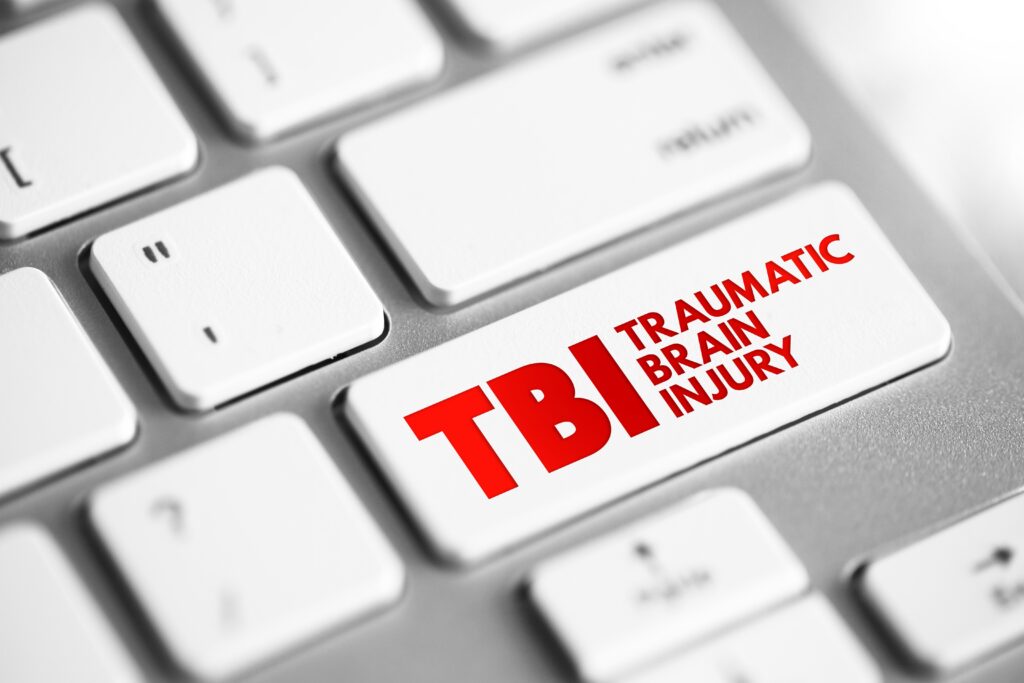Traumatic brain injuries (TBIs) can happen when someone suffers a blow or jolt to the head, and these injuries often result from accidents where someone else is at fault.
If you or someone you love suffered a TBI because of another person’s negligence, you should consult a skilled Omaha traumatic brain injury attorney right away about your legal options. Your lawyer can investigate the circumstances promptly, file an insurance claim on your behalf, and seek the compensation you need.
How do TBIs Happen Due to Others’ Negligence?
TBIs frequently occur when others are negligent in some way. One common scenario where TBIs occur due to negligence is in car accidents. If a driver fails to follow traffic laws, becomes distracted, or drinks and drives, they can cause a collision. When a vehicle crashes, the sudden stop may cause occupants’ heads to hit parts of the car’s interior, such as the steering wheel, dashboard, or windows. Even with airbags, the force of impact can be enough to cause a TBI.

Another instance is in sports – especially those involving physical contact. Coaches and sports organizations have a duty to ensure that proper safety equipment is used and that players are trained in safe techniques. Otherwise, players are at a higher risk of suffering head injuries. For example, if a football player is not wearing a properly fitted helmet because the team did not provide one and then suffers a hard hit, the resulting TBI can be traced back to the team’s negligence.
Slip and fall accidents are also a significant cause of TBIs. Property owners are responsible for maintaining safe environments. If a store owner fails to clean up a spill, fix a broken stair, or provide adequate lighting, visitors can slip, trip, and fall, potentially hitting their heads on hard surfaces. Such negligence can lead to serious brain injuries.
Additionally, TBIs can occur in motorcycle, bicycle, and pedestrian accidents. In these accident scenarios, victims have extremely limited protection from their surrounding environment – including the ground. When a victim’s head strikes the ground or another vehicle with a significant amount of force, they can suffer a debilitating TBI. Like car crashes, these accidents typically result from driver negligence and traffic law violations, like speeding, failing to yield the right-of-way, and distracted driving.
In all of these cases, the key factor is that someone failed to take reasonable precautions to prevent harm. When another person’s negligence leads to a TBI, the injured party may have the right to seek compensation for medical bills, lost income, and other damages. This helps to ensure that those responsible for the negligence are held accountable, and it provides support for accident victims as they recover.
Medical Treatment for a TBI
TBIs can vary widely in severity, and so can the treatments required to address them. When someone sustains a TBI, they may need a combination of medical interventions, therapies, and ongoing care to recover. Understanding the common medical treatment for TBIs and how to recover compensation for these expenses is crucial for those affected.
Medical Treatments for TBIs
- Emergency Care – Immediately after a TBI, emergency care is often necessary. This can include stabilization, imaging tests like CT scans or MRIs to assess the damage, and surgery to relieve pressure on the brain or remove blood clots.
- Medications – Various medications may be prescribed to manage symptoms and complications. These can include pain relievers, anti-seizure drugs, and medications to reduce brain swelling. In some cases, patients may need drugs to manage mood or behavior issues that arise from the injury.
- Rehabilitation – Rehabilitation is a critical component of TBI recovery. This can involve physical therapy to regain motor skills, occupational therapy to help with daily activities, and speech therapy to address communication problems. Cognitive therapy may also be necessary to help with memory, attention, and problem-solving skills.
- Counseling and Support – Emotional and psychological support is also vital for TBI patients. Counseling or therapy can help individuals cope with the changes in their lives and manage any depression, anxiety, or other mental health issues.
- Long-term Care – Severe TBIs may require long-term care, including assisted living or nursing home care. Some patients need ongoing medical monitoring and assistance with basic needs.
Recovering Compensation for Medical Expenses
When a TBI occurs due to someone else’s negligence, the injured party has the right to seek compensation for medical expenses and other damages. Here’s how this process typically works:

- Documentation – Collect all medical records, bills, and evidence of expenses related to the injury. This includes emergency room visits, hospital stays, medications, therapy sessions, and any long-term care costs.
- Legal Action – Consult a personal injury attorney who regularly handles TBI cases. They can build a case, negotiate with insurance companies, and represent you in court if necessary.
- Compensation – Successful claims can result in compensation for past and future medical expenses, lost income, pain and suffering, and other related costs. This financial support is crucial for covering the extensive and often ongoing costs associated with TBI treatment and recovery.
How Do You Prove Negligence in a TBI Case?
Proving negligence in a TBI case is crucial for the injured party to receive compensation for their damages. Negligence occurs when someone fails to exercise reasonable care, resulting in harm to another person. To prove negligence in a TBI case, four key elements must be established: duty, breach, causation, and damages.
- Duty of Care – First, the injured party (the plaintiff) must show that the at-fault party (the defendant) owed a duty of care to the injured person. Duty of care means that an individual or entity is expected to act in a reasonably safe manner to prevent harm to others. For example, drivers have a duty to follow traffic laws to avoid accidents, and property owners must maintain safe premises.
- Breach of Duty – Next, the plaintiff must prove that the defendant breached their duty of care. A breach occurs when the defendant’s actions – or lack thereof – fall below the standard of care expected in a given situation. This can be a driver running a red light or a store owner failing to clean up a spill in a timely manner.
- Causation – The third element is causation, which involves demonstrating that the breach of duty directly caused the TBI. This means establishing a clear link between the defendant’s actions and the injury. In legal terms, this is often broken down into two parts: actual cause and proximate cause. The actual cause, or “cause in fact,” means the TBI would not have occurred “but for” the defendant’s actions. Proximate cause involves showing that the injury was a foreseeable result of the breach.
- Damages – Finally, the plaintiff must prove that they suffered actual damages as a result of the TBI. Damages refer to various losses and harms that the plaintiff experienced, which can include medical bills, lost income, pain and suffering, and long-term care costs. Documenting these damages with medical records, financial statements, and expert testimony is essential for building a strong case.
Evidence and Legal Representation:
Gathering evidence is a critical part of proving negligence. This can include accident reports, eyewitness testimony, medical records, and expert analyses. An experienced personal injury attorney can compile this evidence, build a compelling case, and navigate the legal complexities involved.
By methodically establishing these four elements—duty, breach, causation, and damages—an injured party can effectively prove negligence in a TBI case and seek the compensation they deserve.
Will my TBI Case go to Trial?
Determining whether your TBI case will go to trial depends on several factors, including the strength of your evidence, the willingness of the parties to settle, and the complexity of the case. While many personal injury cases are settled out of court, some do go to trial if an agreement cannot be reached.
- Strength of Evidence – The strength of your evidence is crucial in determining whether your case will go to trial. Strong, clear evidence supporting your claim can encourage the defendant to settle. This includes medical records, accident reports, witness statements, and expert testimonies. If your evidence clearly shows that the defendant’s negligence caused your TBI and that you suffered significant damages, the other party may prefer to settle rather than risk losing in court.
- Willingness to Settle – Settlement negotiations play a significant role in whether a case goes to trial. Both parties often prefer to settle to avoid the time, expense, and uncertainty of a trial. During settlement negotiations, your attorney will present your case to the defendant’s insurance company, and both sides will discuss a fair compensation amount. If the insurance company offers a reasonable settlement that covers your medical expenses, lost income, and other damages, you may choose to accept it. However, if the offer is too low or if the defendant denies liability, your case may proceed to trial.
- Complexity of the Case – The complexity of your TBI case can also influence whether it goes to trial. If the facts of the case are straightforward and both sides agree on the basic details, a settlement is more likely. However, if there are disputes over who is at fault, the extent of your injuries, or the amount of compensation you deserve, a trial may be necessary to resolve these issues. Complex cases involving multiple parties, severe TBIs, or significant financial damages are more likely to go to trial.
- Legal Strategy – Your attorney’s strategy and advice will be essential in deciding whether to settle or go to trial. An experienced personal injury lawyer will evaluate the strengths and weaknesses of your case, negotiate with the insurance company, and advise you on the best course of action. They will prepare for trial if necessary, ensuring that you are ready to present a strong case in court.
Recoverable Damages in a TBI Case
When someone suffers a TBI due to another person’s negligence, they can seek compensation through a legal claim. This compensation is known as damages, and there are several common types a victim can recover. These damages should cover the various costs and effects of the injury on the victim’s life.

- Medical Expenses – Medical expenses are often the most significant type of recoverable damage in a TBI case. This includes the cost of emergency room visits, hospital stays, surgeries, medications, and follow-up appointments. It also covers rehabilitation costs like physical therapy, occupational therapy, and speech therapy. Future medical expenses for ongoing care and treatment can also be included.
- Lost Earnings – A TBI can prevent someone from working, either temporarily or permanently. Lost income covers the income the victim misses out on while they are recovering. If the injury affects the person’s ability to work in the future, they can also make a claim for loss of earning capacity. This means they can receive compensation for the difference between what they may have earned if they hadn’t suffered an injury and what they can earn now.
- Pain and Suffering – Pain and suffering damages compensate for the physical pain and emotional distress resulting from the TBI. This can include chronic pain, depression, anxiety, and the overall loss of life enjoyment. Calculating these damages can be challenging because they are more subjective, but they are an essential part of making the victim whole again.
- Property Damage – If the incident that caused the TBI also resulted in property damage, such as a car accident, the victim can seek compensation for repairs or replacement of the damaged property. This helps cover the costs of fixing or replacing items that were broken or destroyed.
- Loss of Consortium – Loss of consortium damages are meant to compensate the spouse or family members of the injured person. A TBI can significantly affect relationships and the ability to participate in family life. These damages recognize the emotional and relational toll that a severe injury can have on loved ones.
- Punitive Damages – In some cases, if the defendant’s actions were particularly reckless or malicious, the court may award punitive damages. These are not meant to compensate the victim but to punish the wrongdoer and deter similar behavior in the future.
Talk with an Experienced TBI Lawyer Today
If you or a person you love suffered a TBI in an accident stemming from someone else’s negligent behavior, you may be eligible for substantial compensation. A skilled Omaha personal injury attorney can fight for your rights and ensure that you receive the compensation and justice you deserve.